Educational Theatre, Storytelling and the arts, MACOURSE DESCRIPTION: Literature, art, music, and new media created for adolescent or young adult audiences strongly influence how youth construct themselves and interact in their social worlds. Educators who ignore youth culture, as played out in the media and the arts, lose an invaluable site of engagement for their students. Through studies of primary texts, as well as critiques, we will engage current literary theories including response theories and cultural studies. Participants will also experience and critique pedagogical practices related to adolescent literature in the classroom, including methods of integrating literature and media studies into all areas of the curriculum. COURSE DESCRIPTION: This course will examine artistic development from infancy through adulthood with an emphasis on how sound art education can support, enrich, and nurture cognitive, emotional, and social development. Classic and contemporary theories in the field of educational psychology and art education will be examined, various media and learning will be addressed, and students will be encouraged to connect experiences from classroom observations and their own histories to course discussions and projects. Modules will address teaching through readings and fieldwork, with extension activities and opportunities during other times (studio lesson explorations, school visits, and museum/performance field trips). COURSE DESCRIPTION: Students will explore the rich potential of education-focused creative and expressive arts-visual arts, creative drama, music, dance, and movement, as an educational methodology for students with disabilities. Along with building a repertoire of teaching tools and strategies, students will engage with and examine learning styles, communication and expressive modalities, planning, assessment of special populations, and current research leading the way. COURSE DESCRIPTION: This course examines the nature of aesthetic experience as a unique and powerful way to know self and world. It attempts to uncover connections between arts and education and help arts educators (and other creative teachers) articulate mission statements for the role of the arts in education (and the arts in their own teaching). COURSE DESCRIPTION: Students will apply educational theatre strategies to enliven learning about Shakespeare. They will explore a range of character development and scriptwriting strategies to develop original characters and monologues inspired by Shakespeare’s language and historical period. COURSE DESCRIPTION: Students will explore how to utilize theatre inclusively in classroom, workshop, or professional development settings to foster creative expression and critical thinking for adolescent learners. Students will develop tools to implement and facilitate theatre lessons that encompass all areas of theatre study: theatre history, acting, production, and technical theatre. COURSE DESCRIPTION: Students will explore the history, foundations and methods of creative dramatics, including theatre games, creative movement, story drama, playmaking, applied theatre, and drama-based instruction, among others. They will explore the role of literature and script writing in the creative dramatics curriculum. COURSE DESCRIPTION: Through creative exploration of spoken word poetry and storytelling, students will discover engaging ways to support the oral language and literacy development of culturally and linguistically diverse learners. They will develop their own expressive literacy skills through creative speaking and writing, exploring the musicality and sensory richness of human language. COURSE DESCRIPTION: Students will explore contemporary and traditional crafts made by hand in various media (e.g. fiber, clay, papercraft) in terms of education contexts and digital learning communities. Topics such as community weaving projects, yarn bombing and guerrilla art, and the development of sensory skills through hand-made objects will be addressed. COURSE DESCRIPTION: This introductory museum education course explores museum education's principles, processes, practices, and current innovations. It explores the various learning modes in museums, including how educational programming can engage diverse audiences and methodological approaches to object-based learning in a museum setting. Topics include art education, contextual visual thinking, active learning strategies, and other related processes, reflected in the weekly modules. Through posted discussions, virtual and in-person site visits, and critical thinking projects, students will have the opportunity to begin their investigation of educational and artistic programming in museums. COURSE DESCRIPTION: Candidates conduct an arts inquiry project, which may include traditional research, new media curriculum development, action research, service learning, or field based inquiry. Special topics will be offered. Candidates complete “synthesis” phase of their portfolio. *Recommended in final semester before or during student teaching.
0 Comments
Leave a Reply. |
Myungja Anna KohArtist Categories
All
Archives
July 2024
|
Proudly powered by Weebly


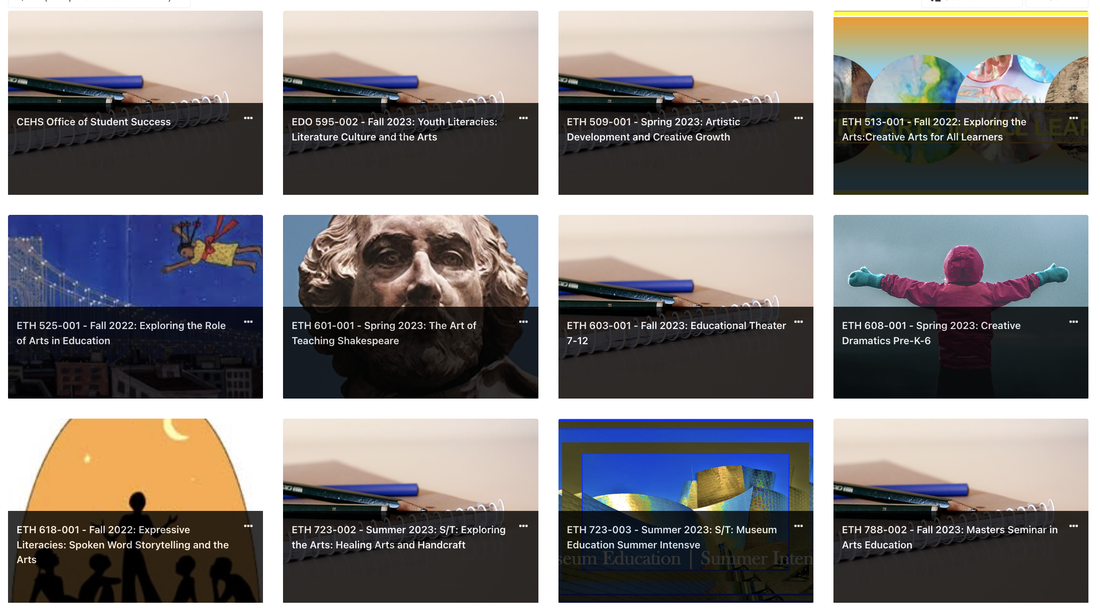

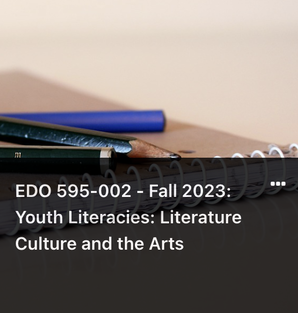
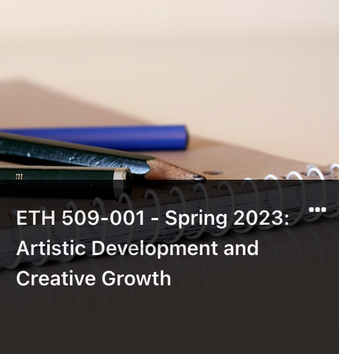
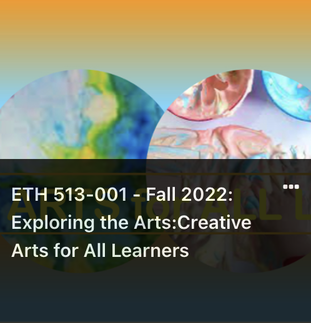
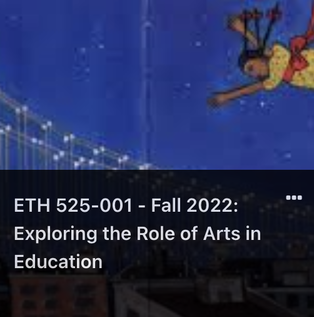
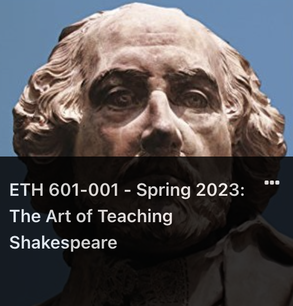
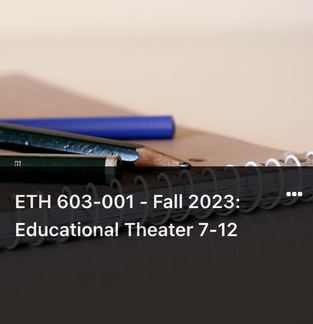
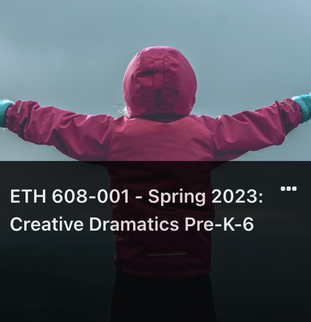
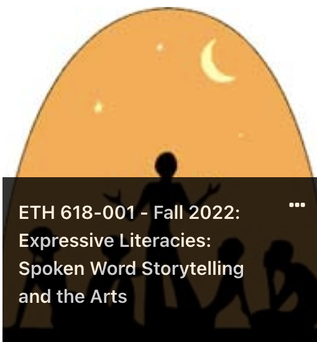
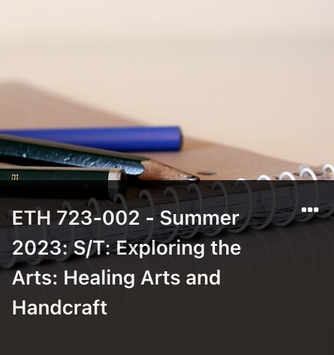
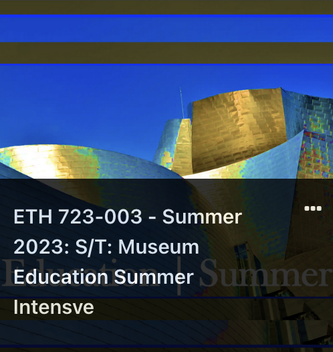
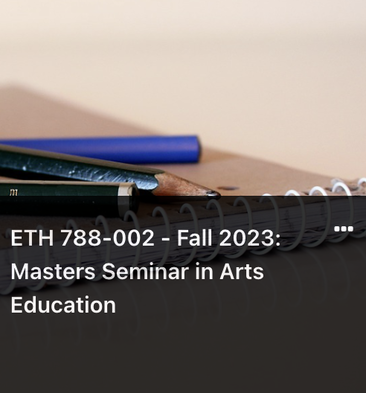
 RSS Feed
RSS Feed